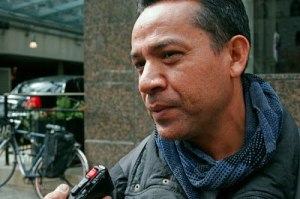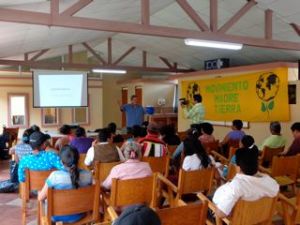On February 20, PROAH accompanied COFADEH’s lawyers and the Committee of Environmentalists of Siria Valley. That morning 17 environmentalists from the Siria Valley filed into the 5th courtroom of the Honduran Supreme Court of Justice accused of impeding a private deforestation project in their area. The delegation was so large that they couldn’t all fit in the courtroom’s allotted space for defendants. The case is now two years old (link in Spanish). PROAH has reported on the case and accompanied the Committee during that time. On April 7, 2010 approximately 500 community members gathered to protest and defend the trees that protect a watershed in their area that supplies the surrounding communities. Of the hundreds of protesters, 17 were accused of impeding a deforestation plan that the Committee of Environmentalists of the Siria Valley has denounced as illegal due to issues surrounding land tenure. At the end of 2009 they had filed a grievance with the Public Prosecutor’s Office, and to this date have received no response.
Before the hearing a letter from international organizations addressed to Honduran authorities and the Canadian ambassador was circulated. The letter expressed “worry for the criminalization of the defense of the environment and human rights in Honduras” and support for the 17 environmentalists. The letter also quoted a Siria Valley community member: “How is it possible that the public prosecutor for the environment can accuse environmental defenders whose only objective is the defense of life and the protection of water?” (This public prosecutor is specifically responsible for prosecuting cases that have to do with the environment.)
The defense was able to prove 5 of the defendants were not even present at the protest on April 7, 2010. The defendants were represented by Kenia Oliva and Karol Cardenas of COFADEH (Comité de Familiares de los Detenidos y Desaparecidos de Honduras). In his testimony, Carlos Amador (General Secretary of the Committee of Environmentalists of Siria Valley) expressed that the case was purely a criminalization of environmental defenders. On Monday, February 25 the presiding judge Mario Díaz read the resolution of the case absolving the accused of all responsibility and leaving them free of all charges (link in Spanish). One of the defendants, Reynaldo Guerra, a former mayor in the Siria Valley region, expressed the Committee’s contentment with the decision and said “we continue to be committed to the protection of the environment, as much mining exploitation as deforestation.”

Carlos Amador, General Secretary of the Environmental Committee of Siria Valley; photo from the Committee’s Facebook page.
A battle was won on February 20, but their fight continues. Carlos commented that it is just a momentary step and that “there are more difficult things coming for environmentalists.” The long-disputed mining law that passed recently in the Honduran Congress presents a whole host of new challenges for environmentalists across the country. Specifically in the Siria Valley Five Star Mining (owned by Gold Lake) has set its sights on the region to exploit iron, according to Carlos. The company already has a presence in Monte Redondo in northern Honduras. “It’s a double threat with the approval of the new law. Siria Valley is going to become a place for a lot of new businesses to come exploit gold,” said Carlos. He is sure that this will not be the last attempt to delegitimize environmental activism, adding, “Companies will look for any other mechanism to continue criminalizing environmental defenders.”
